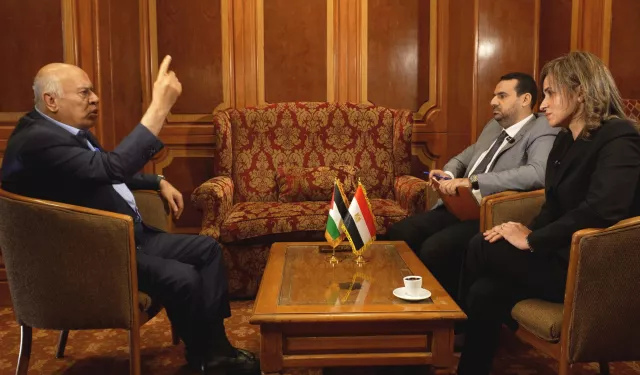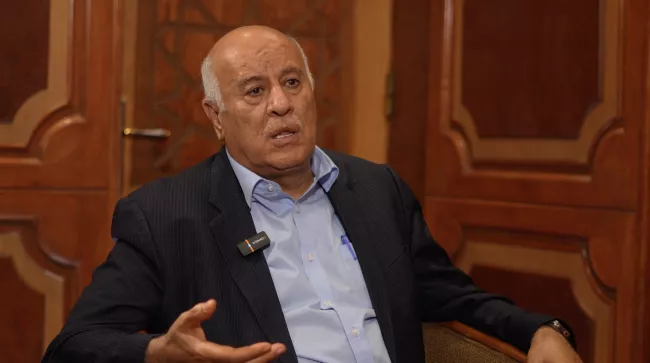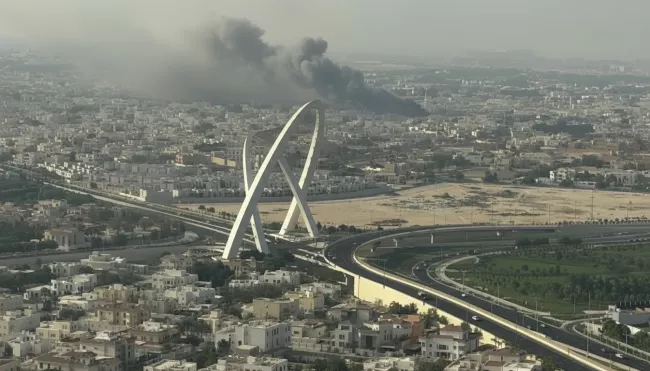
Interview| Jibril Rajoub: Arab support for the PA is insufficient
What is happening in Gaza is a crueler Holocaust
Against the backdrop of a fragmented Palestinian political scene and a complex regional environment, Al Manassa interviewed Maj. Gen. Jibril Rajoub in Cairo. The meeting came hours after the targeting of Hamas' political bureau leaders in Doha last week, before the Israeli operation’s failure was even confirmed. Rajoub is secretary general of Fatah’s Central Committee and head of the Palestinian Authority’s sports sector.
The neighborhood bully
The strike on Hamas leaders in Qatar signaled a dangerous escalation, both as part of Israel’s ongoing assault since Oct. 7 and in terms of Gulf security. Rajoub argued this reflects the mentality and methods of “the fascist right” and “the new Nazis” in Israel, who, in his words, behave like “the neighborhood bully.”
“They trivialize everything, and the clearest evidence is Gaza: ethnic cleansing, genocide, deprivation of basic rights like water and medicine. They also carry out incursions in Jerusalem, Judaization efforts, and aggression beyond their borders,” he said.
Rajoub added that such operations expose the weakness and failure of PM Benjamin Netanyahu’s government, as well as its shallow grasp of the region’s future; one Israelis themselves hope to be part of.
He described the Qatar strike as proof of Netanyahu’s “bankruptcy,” noting it targeted the capital of a state that “had previously, at Netanyahu’s own request, provided funds and assistance to deepen Palestinian division and bury the Palestinian state.” He called the attack “an affront to international law.”
Israeli media have previously reported that Qatar funded Hamas from 2012 to 2018 with Israeli approval.
Reading the attack
Rajoub said that Israeli jets flying over Arab states on their way to target the Hamas leadership in Doha sent key messages, not only to Qataris and Palestinians but to three additional audiences.
The first was directed to Arab governments, who should revisit their positions and return to the Arab Peace Initiative. Rajoub urged “a review of relations and agreements between Arab states and Israel, and a rejection of integration and normalization with Israel until a Palestinian state is established and Palestinian suffering ends.”
He expressed cautious optimism about this month’s Saudi-Egyptian initiative adopted by the Arab League Council of Foreign Ministers describing it as a sign of “dissatisfaction, rejection, and a sense of obligation to reconsider ties with Israel and link integration and normalization to statehood and Israel’s return to internationally recognized borders.”
“Israel attacks Arab states, annexes Palestinian land, destroys Gaza and builds settlements,” Rajoub said, pointing out that such actions occur even while “Israel maintains embassies and relations with some Arab actors.”
The Arab League resolution based on the Saudi-Egyptian proposal included seven points. Among them was an emphasis that any cooperation, integration, or coexistence arrangements among the region’s countries cannot be sustained as long as Israel continues its occupation of Arab territories or poses a veiled threat to occupy or annex other Arab lands
The second message sent by the attack on Qatar, Rajoub said, was for the international community. “The descendants of Holocaust victims are carrying out a new Holocaust, harsher and more brutal, against Palestinians, despite Palestinians having had no role in what happened in the past.”
“Recognition of the Palestinian state by certain countries is significant, but there must also be sanctions, boycotts, and isolation of this monstrous example,” he added.
The third message was for the US administration. “It is unacceptable that after Abraham Lincoln’s struggle, the principle of human rights, and the right of peoples to self-determination, that the US is governed by a president who speaks with childishness, recklessness, and a lack of vision. Even at its lowest level, that vision should uphold the basics of US foreign policy, namely that this is occupied land and the Palestinians are a people entitled to live.”
Rajoub argued that President Donald Trump has became “a puppet in the hands of the new Nazis ruling Israel, who enjoy unwavering support and sponsorship without any regard for international law, conventions, or even the UN Headquarters Agreement, given that the US denied entry visas to President Mahmoud Abbas and the Palestinian delegation.”
He described Palestinian president, Mahmoud Abbas as “exceptional in his understanding and management of the Palestinian situation, which is grounded in peace, rejection of bloodshed as an option, and mutual recognition until the Palestinian state is realized.”
UN pressures
At the time of the interview, Rajoub predicted Hamas' leaders would survive the strike, which he said “failed to achieve its objectives,” warning there would be repercussions for those behind this “stupid decision.” He emphasized that “Netanyahu is under pressure ahead of the UN General Assembly, searching for an image of victory that could justify halting his aggression against the Palestinians. But complications await Israel and the US at the assembly, whose outcomes will further isolate Netanyahu and hinder his acceptance in the international community.”
As for why the strike against Qatar, a mediator with good relations with the US, came at that moment, Rajoub said Netanyahu sought not an end to war but “an image of victory to overshadow whatever awaited him at the UN.” He argued the session “will be a turning point in the history of the global order.”
Three issues Netanyahu fears
According to Rajoub, Netanyahu is pushing disruptive moves out of fear of three issues. “First, several Western countries plan to recognize the Palestinian state. Second, sanctions loom over him and his government—these are inevitable, with countries like Spain leading the way. Third, Netanyahu fears losing international cover, even from the US, because Trump is unstable and unpredictable. America’s deep state and interests are not aligned with total surrender to Israel’s fascist right-wing.”
Full UN membership for Palestine would intensify pressure on Netanyahu and Israel, Rajoub said.
At the same time, he urged “the Arab nation and friends of Palestine” to continue their solidarity and “support us only as Palestinians,” without making distinctions. “I am from Fatah, and I do not call for besieging Hamas. My call is: love us as Palestinians.”
“Palestinian steadfastness is the highest form of resistance, because the demographic reality, more than 50% of the population in historic Palestine—is our trump card,” he concluded.
Ending the division
Rajoub noted that reconciliation efforts have repeatedly failed, despite public rhetoric from Fatah, Hamas, and the PA. He attributed failure to indirect causes. “Unless these are addressed, no agreement, no matter how sincere, will succeed.”
“Many intervened in good faith; the Algerians, Chinese, Russians. Egypt has been a constant actor throughout the division. But if indirect causes remain unresolved, no agreement will endure. We must clear the table and deal with these issues,” he said.
He argued the core problem between Fatah and Hamas is not policy, ideology, or resistance but the struggle for power. “The solution lies in ballot boxes, not ammunition boxes. Palestinians must be free to choose their representatives and transfer power democratically and peacefully.”
Rajoub called for “moving beyond deep-seated political and social issues with genuine conviction, avoiding political games, and opening space for cooperation once the badmouthing and accusations of treason and apostasy come to an end.”
He stressed that “any unity must be built on recognition of UN resolutions, the Arab Peace Initiative, and PLO commitments, while acknowledging the PLO as the sole legitimate representative of the Palestinian people.” He added that “one authority, one law, one army, and one police force” are prerequisites without which the international community will not accept a Palestinian state.
The day after and the PA’s readiness
To prepare for ending the nearly two-year war in Gaza, and given Israel’s opposition to PA or Hamas' involvement in governance of the strip, Egypt proposed a civilian administration of nonpartisan figures called the Community Support Committee.
Hamas accepted the Egyptian plan, but Fatah and the PA disagreed. Rajoub said, “A committee separate from the PA and government would only entrench division and occupation. There must be one government, with a special committee to oversee Gaza.” He asked, “If a problem arises in [the Egyptian governorate of] Sohag, would a new committee or government be formed to manage it?”
“Any framework must maintain unity of territory from Rafah to Jenin, unity of the system, and unity of services. Any other arrangement will fail,” he insisted.
Asked whether the PA is ready to govern Gaza now rather than wait for the ‘day after,’ Rajoub said, “I cannot say whether the PA is capable or not. But it is the legitimate body with the right to govern Gaza. However, national consensus must precede the return, which must be by agreement, not through finding loopholes or political gambles. Agreement is essential.”
Call to the Arabs
Rajoub said “Arab support for the Palestinian cause is insufficient.” He urged Arab states funding the PA, if they have concerns about spending, to directly support sectors like education, health, development, and reconstruction.
He acknowledged the PA needs “political, financial, and media reform,” but rejected the idea that such issues justify abandoning responsibilities towards Palestine. “We need political, security, judicial, administrative, financial, and media reform—but we can achieve this ourselves,” he said.
Rajoub concluded by emphasizing the importance of Arab backing for Palestinian institutions and the resilience of Palestinians as their strongest weapon. Yet he acknowledged that unity and an end to division remain distant as long as the power struggle continues.
Finally, he called on Egypt, as a bordering state, to “initiate conditions for a single Palestinian homeland, where one people live with one cause, one leadership, one agreed goal, and one agreed method of struggle capable of confronting the occupation.”


